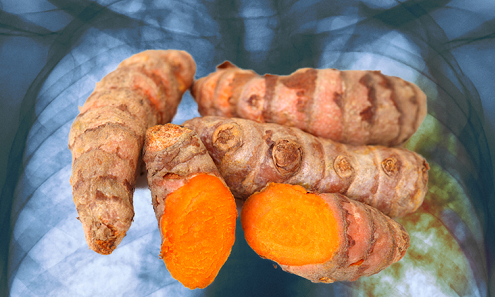A study by Indian scientists has found that nanoparticle-formulated Curcumin – a bioactive component in Turmeric has therapeutic properties, which can significantly reduce reactivation and reinfection of Tuberculosis. Curcumin can also speed up antibiotic therapy and overcome drug-resistant TB, the study added.
A study by Indian scientists has found that nanoparticle-formulated Curcumin – a bioactive component in Turmeric has therapeutic properties, which can significantly reduce reactivation and reinfection of Tuberculosis. Curcumin can also speed up antibiotic therapy and overcome drug-resistant TB, the study added.
The research was jointly conducted by scientists from Special Centre for Molecular Medicine, Jawaharlal Nehru University, and International Centre for Genetic Engineering and Biotechnology, both in New Delhi, Department of Biochemistry, University of Calcutta, School of Biotechnology, KIIT University Bhubaneswar and Vanderbilt University School of Medicine, United States.
Turmeric or Indian Yellow Gold is known for its efficacy against several chronic inflammatory and infectious diseases. But the translational potential of Curcumin is limited by its low systemic bioavailability due to its poor intestinal absorption, rapid metabolism and rapid systemic elimination.
“We developed a simple one-step process to generate curcumin nanoparticles of ~200 nm in size, which yielded a fivefold enhanced bioavailability in mice over regular curcumin,” wrote the researchers led by Prof. Prof. Gobardhan Das of JNU in their study. “Curcumin nanoparticles drastically reduced hepatotoxicity induced by antitubercular antibiotics during treatment in mice. Most interestingly, co-treatment of nanoparticle-formulated curcumin along with antitubercular antibiotics dramatically reduced the risk for disease reactivation and reinfection, which is the major shortfall of current antibiotic treatment adopted by Directly Observed Treatment Short-course.”
Tuberculosis (TB) is one of the top 10 causes of death worldwide, with India, Indonesia, China, Nigeria, Pakistan and South Africa accounting for 60% of the total. In 2015, 10.4 million people fell ill with TB and 1.8 million died from the disease (including 0.4 million among people with HIV). Globally in 2015, an estimated 480 000 people developed multidrug-resistant TB (MDR-TB) according to World Health Organisation, WHO.
The internationally accepted therapy for TB, Directly Observed Treatment Short-course (DOTS) is effective but has multiple serious shortfalls. Even though called short-course, the regimen involves 6–9 months of treatment for regular TB and 12–24 months or more for drug-resistant TB. This poses substantial risks for the generation of drug-resistant variants of the mycobacterial organisms. In addition, this mixture of antibiotics shows marked toxicity, often leading to treatment cessation by patients.
DOTS-treated patients exhibit post-treatment susceptibility to reinfection and disease reactivation. It was noted, that anti-tubercular antibiotics such as isoniazid (INH) cause toxicity to antigen-activated T cells during treatment, which might contribute to post-treatment hyper-susceptibility to disease reactivation and reinfection. Therefore, addition of an agent that improves the immune system to antibiotic therapy that reduces the treatment length and restores host protective immunity is desired not only for improving the treatment outcome but also to reduce the possibility of generating multiple and extremely drug-resistant (MDR and XDR) variants of TB.
TB is a complex disease with two components – replicating microorganisms and inflammation. Therefore, addition of anti-inflammatory drugs along with antibiotics is considered to be beneficial. In fact, it has been shown that addition of steroids to conventional antitubercular antibiotics yields improved therapeutic efficacy.
Curcumin is an excellent anti-inflammatory agent and has therapeutic potential in a variety of diseases. Despite the myriad of activities reported, curcumin is yet to be approved as a therapeutic agent due to bioavailability issues, noted the researchers. Many clinical and experimental studies have clearly established that regular curcumin has very low bioavailability and is thus unsuitable for prolonged use. Low systemic bioavailability of curcumin after oral dosing has been consistent throughout decades of studies in preclinical models as well as human clinical trials. Therefore, enhancing the bioavailability of curcumin is the main challenge for its applications in therapeutics.


